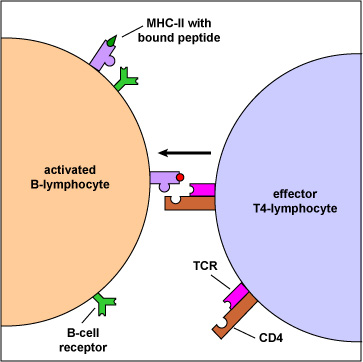
Exogenous antigens are those from outside cells of the body. Examples include bacteria, free viruses, yeasts, protozoa, and toxins. These exogenous antigens bind to B-cell receptors and enter B-lymphocytes through endocytosis. After lysosomes fuse with the phagosome, protein antigens are degraded by proteases into a series of peptides. These peptides eventually bind to grooves in MHC-II milecules and are transported to the surface of the B-lymphocyte. Effector T4-lymphocytes are then able to recognize the peptide/MHC-II complexes by means of their T-cell receptors (TCRs) and CD4 molecules.
Last updated: August, 2019
Please send comments and inquiries to Dr.
Gary Kaiser